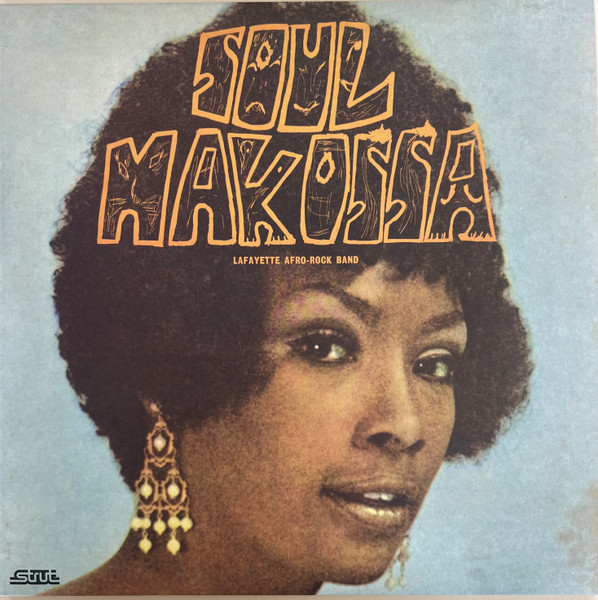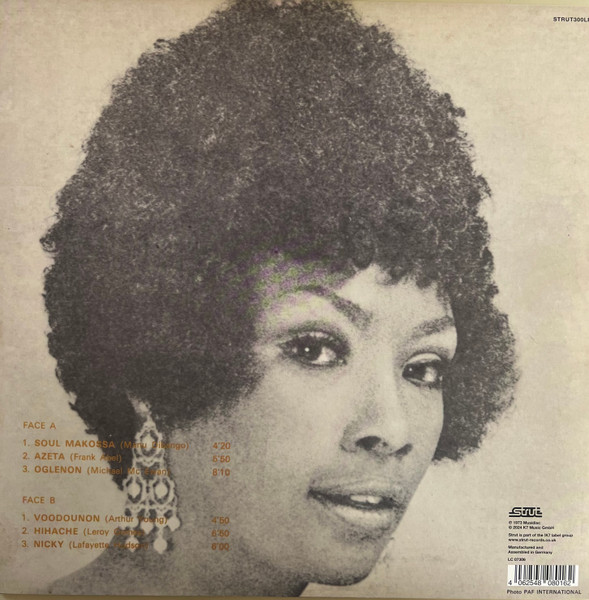DESCRIPTION:
1973 Afro Jazz/ Funk & Soul LP Repressed on Blue Teanslucent Vinyl - Championed By David Mancuso @ The Loft & Sampled Many times
Strut proudly presents the first official remastered reissue of the funk/Afro classic, Lafayette Afro Rock Band's 'Soul Makossa' from 1973. In 1971, an undocumented seven-member Afro-American ensemble known as the Bobby Boyd Congress made a transformative journey from the United States to France. Bandleader Frank Abel recollects,"We sensed that the soul and funk market was saturated back home, and our original plan was a brief 6-month stint in Paris. Surprisingly, we ended up staying for a decade." Upon lead singer Bobby Boyd's return to the U.S., the group rebranded as Ice and crossed paths with independent producer Pierre Jaubert, a seasoned studio professional with credits on groundbreaking recordings alongside Charles Mingus, John Lee Hooker, and Archie Shepp, among others.
Drawing inspiration from Motown's work ethic, Jaubert initiated regular rehearsals with Ice. He recalled, "I didn't want to mimic Berry, but with seven talented musicians collaborating daily, something unique emerged." The band, residing in Paris and immersed in the African-dominated Barbesse district, began infusing African elements into their music frequently performing with Paris-dwelling Camaroonian and legendary composer Manu Dibango.
Rechristening themselves Lafayette Afro Rock Band, the group's musical direction shifted towards predominantly instrumental compositions, characterized by a weightier, more intricate Afro-funk sound. Their debut recording under this new moniker, 'Soul Makossa,' made a powerful impact with a dynamic rendition of Dibango's classic, coupled with the intense break of 'Hihache' and the contagious 'Nicky.' Initially released by Musidisc in France and later in the U.S. via Editions Makossa, the album omitted the title track due to publishing clearance issues.
Despite modest sales upon its initial release, the album's enduring influence became evident as hip-hop culture surged in the '80s, establishing it as a primary source for samples and riffs. The iconic 'Hihache' break found fame in Biz Markie's 'Nobody Beats The Biz,' and tracks from the album were lifted by LL Cool J, The Beatnuts, Kruder & Dorfmeister, and numerous others.
This remastered reissue, the first of its kind, meticulously crafted by The Carvery from the original tapes, showcases the album in its entirety and includes the full original artwork.
Please note the information is done on a artist keyword match and data is provided by LastFM.

Though little known in their native U.S., the Parisian-based Lafayette Afro Rock Band was among the premier funk outfits of the 1970s, later becoming a seemingly endless source of samples and breaks for artists from Public Enemy to Janet Jackson. The group was formed on Long Island, NY as the Bobby Boy Congress; deciding America was already overloaded with funk acts, in 1971 they relocated to France, but when frontman Bobby Boy returned stateside the remaining members -- guitarist Larry Jones, bassist Lafayette Hudson, keyboardist Frank Abel, horn players Ronnie James Buttacavoli and Arthur Young, drummer Ernest "Donny" Donable and percussionists Keno Speller and Arthur Young -- renamed themselves Ice and became the house session band at producer Pierre Jaubert's Parisound studio. Regularly performing live in Paris' Barbesse district -- an area made up primarily of African immigrants -- Ice's driving funk became increasingly influenced by African rhythms and textures, and in the wake of their 1973 debut LP Each Man Makes His Own Destiny, Jaubert changed the group's name to the Lafayette Afro Rock Band.
Guitarist Michael McEwan replaced Jones in time to record 1974's Soul Makossa (issued in the U.S. as Movin' & Groovin'), highlighted by the oft-covered and much-sampled "Hihache"; the follow-up, Malik, featured the cut "Darkest Night," its desolate saxophone intro later sampled for use by Public Enemy for the It Takes a Nation of Millions to Hold Us Back track "Show 'Em Whatcha Got" in addition to providing the foundation for Wreckx 'N' Effect's "Rump Shaker" and Tuff Crew's "Nut." Also in 1975, the Lafayette Afro Rock Band backed jazz pianist Mal Waldron on his unreleased Candy Girl album; the year following, they collaborated with expatriate bluesman Sunnyland Slim on his album Depression Blues. With 1976's Frisco Disco, the group reverted to the Ice moniker; concurrently, working under the alias Captain Dax, they scored a novelty hit in Japan with the single "Dr. Beezar, Soul Frankenstein." Afro Agban followed in 1978, while as Crispy and Co., the band resurfaced that same year with Funky Flavored before returning to America and disbanding. ~ Jason Ankeny, All Music Guide
Read more on Last.fm. User-contributed text is available under the Creative Commons By-SA License; additional terms may apply.


